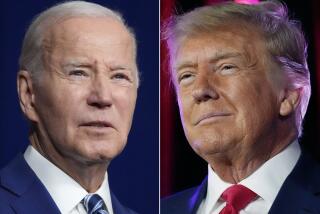The Birth Pangs of Arab Democracy
- Share via
For the Arab world, 2005 may be remembered as the year of the election. Today, Palestinians will choose a new president. Three weeks later, Iraqis will elect a national assembly. This will be only the beginning. Palestinians will go to the polls no fewer than three more times before the year is out, to elect municipal councils, a new legislative body and new leadership within Fatah, the dominant political party. The Iraqi assembly, in addition to forming a government, will write a constitution that will be put to a national referendum in the fall, followed by new elections.
Since Palestine and Iraq are the twin causes on which the eyes of the Arab world have been riveted, their example will reverberate throughout the region. And they will not be the only places where elections will be held.
From February through April, Saudi Arabia will hold municipal elections throughout the kingdom, a landmark step of popular participation for an absolutist regime that has imprisoned academics merely for advocating constitutional monarchy.
This spring, Lebanon will hold parliamentary elections. These are nothing new, but for the first time, a multiethnic opposition to the Syrian puppet regime might actually win a significant share.
Late in the year, Egypt will hold parliamentary elections, the first step toward choosing a president. The presidential outcome is noncompetitive and foreordained if, as expected, Hosni Mubarak seeks another term. But restlessness with the rule of the 76-year-old chief who has held the presidency for more than 24 years may result in livelier-than-usual contests for parliamentary seats. Elections are also scheduled in Yemen and Oman.
It’s an extraordinary moment in a region that until now has resisted the tide of democratization that has reached every other corner of the world. Even such distant climes as sub-Saharan Africa can boast that 19 of its 48 governments (40%) have been chosen by the people in competitive elections. But among Arab states the record is zero out of 22.
Still, this year’s efflorescence of voting is being greeted with skepticism from some quarters.
A columnist in Egypt’s Al Ahram, for instance, said “one would think the Arab countries are living the spring of democracy” but went on to question the meaningfulness of it all, implying, as another skeptical Egyptian intellectual put it, that all these exercises add up to nothing more than “painting the house ... a soap opera, a response to American pressure.”
This last point is particularly interesting. The fact is that even though the war on terror and the intervention in Iraq have driven American popularity in the Arab world to a nadir, President Bush’s strategy of fomenting democracy in the Middle East is gaining traction. Washington’s new advocacy of democratization, reinforced by economic and diplomatic initiatives as well as its military presence, has made authoritarian governments squirm and has emboldened reformers.
Some Arabs may not be happy that these elections are coming at the instigation of the Americans, but the fact that American pressure is one impetus behind them does not make them any less important. (As the host of last year’s reform conference in Alexandria put it: “If the Americans say they are against corruption, must I then be for it?”)
It’s true that virtually all of the upcoming elections will be flawed.
Violence will keep many Iraqis from the polls. Fatah’s presidential candidate, Mahmoud Abbas, will not face any serious challengers. Syrian occupiers will keep a majority of Lebanon’s legislators in their pocket. Saudi municipal councils will remain half-appointed, and women may not be allowed to participate in voting to fill the other half. But the skeptics are too cavalier. The sudden plethora of elections signifies a gathering momentum for the idea of popular sovereignty and a corresponding delegitimization of the various rationalizations for authoritarianism -- heredity, national unity, divine will and the like.
The hoariest excuse for Arab dictatorship has been the need for an iron fist as long as the Arab nation is under challenge. We can’t risk reform while Israel occupies Palestinian land, they have said, an excuse that has carried weight despite its illogic. But even the most passionate Arab nationalist will see its hollowness if the Palestinians themselves, although not yet a state, are conducting politics by democratic methods.
And won’t it be humiliating if the Iraqis under occupation select their own government while other Arabs, untouched by foreign domination, aren’t permitted to do so?
Sure, the elections result from pressures, foreign and domestic. But the people bringing the pressure aren’t going to be satisfied with empty rituals. 2005 will be the year of Arab voting and perhaps, as well, of the birth pangs of Arab democracy.
More to Read
Sign up for Essential California
The most important California stories and recommendations in your inbox every morning.
You may occasionally receive promotional content from the Los Angeles Times.













